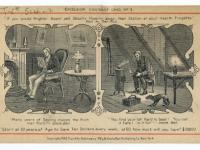Perhaps the classroom's most significant role is equipping students with the knowledge and skills necessary for success. In value systems all around the world success often builds upon economic soundness. Financial education, however, has become scant in primary and secondary schools. For this reason, HSP wants to invite you to participate in Thrift Week! HSP is hosting a public document display and a free teacher workshop as an opportunity for you to learn about the historical significance of thrift and its relevance in the classroom today.
Thrift Week begins on January 17th, which is the birthday of Benjamin Franklin, also occasionally known as “the grandfather of thrift”, and ends on the 23rd. The observance of Thrift Week will help introduce an exciting and broadened perspective on teaching thrift. How can you get involved? Come visit HSP’s current display called, “To Save in Little Things: An American History of Thrift," which showcases a historical document collection on thrift. It incudes World War II conservation efforts, a late 19th century social movement, and the School Savings Banks program, a strategy for banks and schools, largely lead by local Sara L. Oberholtzer. You will be able to view flyers, images, bulletins, books and more; all of the documents in the exhibit will shed light on the historical emphasis of saving, budgeting, work ethic, and stewardship as key aspects of public life, or, generally, thrift.
On January 23rd, HSP will be hosting a free teacher workshop, “Teaching Thrift: An Interdisciplinary Approach to a Historical American Ethic," introducing exciting new ways to incorporate financial education, history, and literacy into your curriculum. Instructor Bernadette McHenry explains thrift in such a way that will challenge connotations of thrift as just “thrift store” and “cheap spending” and replace it with a holistic outlook on the personal and societal instances of the thrift ethic. Introducing thrift curriculum into your classroom means educating your students to an old and valuable American ethic. Consisting of saving money, cultivating a work ethic, and being generous, thrift is a basic foundation for teaching financial education and home economics, while cultivating historical literacy. (The workshop includes refreshment, and Act 48 credit will be given.)
Surely, economics, politics and livelihoods have changed over the past century since Thrift Week first began in 1916; however, the need for financially savvy and civically-minded people is ongoing. Combining modern day skills with historical thrift lessons is something from which everyone can gain. In the words of Sara Oberholtzer, “teach the children thrift and self-responsibility…we will have a nation of thoughtful and temperate people.” Take the time to browse the following link to find out more about thrift curriculum and the upcoming Thrift Week!
Learn more about Teaching Thrift

